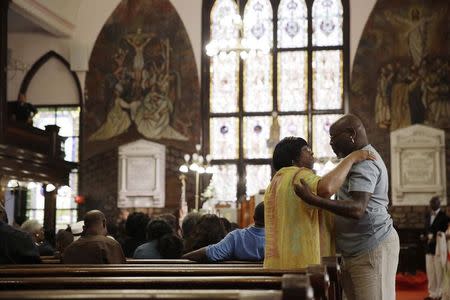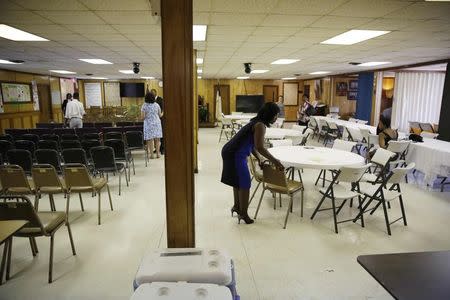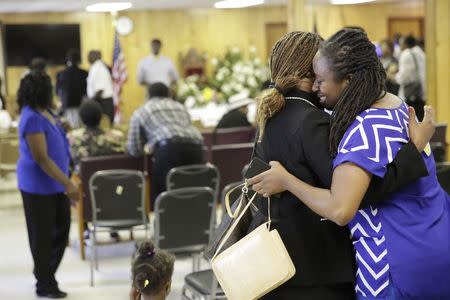Wednesday Bible study: Charleston attack upsets a Southern tradition
By Luciana Lopez
CHARLESTON, S.C. (Reuters) - Brushing aside her son's concerns, Rosa Ellington plans to keep attending Wednesday evening Bible studies as she has the past 15 years, despite last week's massacre of nine black worshippers at a nearby church in Charleston, South Carolina.
The sessions had been a sustaining, if mostly uneventful, fixture of her weekly routine, until last Wednesday, when Dylann Roof, a white 21-year-old, is accused of having gunned down the people gathered at the nearly 200-year-old Emanuel African Methodist Episcopal Church in the city's historic downtown.
Wednesday night Bible study is a cornerstone of religious life across the Southern United States, and particularly in Charleston, dubbed the Holy City because of its many churches.
While the horror of that evening was undeniable, Ellington said she has no intention of giving up her beloved weekly church ritual, which falls half-way between Sunday services.
“I can’t be a prisoner in my own house,” said Ellington, who attends Morris Brown AME, not far from 'Mother Emanuel', where the killings took place. “You can’t let one person determine how you’re going to live your life.”
She said she had noticed security was now tighter at her church, but despite her determination to stick with her routine, Ellington’s son, Robert, said he's asked her to consider not going. After last week's bloodshed, he is simply worried about her safety, even at her own church.
“If you can’t be safe there, where can you be safe?” he wonders aloud.
Like Rosa Ellington, many believers insist there is no good reason to change their routines in the face of a brutal attack that authorities believe was racially motivated. The U.S. Justice Department is investigating the murders as a hate crime.
“That’s what we’re calling for: for people to please don’t stop your activities on Sundays and Wednesdays,” said Elder James Johnson, president of the Charleston chapter of the National Action Network, a civil rights organization founded by Reverend Al Sharpton.
Even so, Johnson has received calls from people concerned about going back to their churches, and he has asked the city to increase police patrols around places of worship.
The Charleston County Sheriff's Office confirmed it has started to beef up security, though a spokesman said there have been no threats against the city's churches since last week's shootings.
Wednesday night Bible study has deep roots, said Doug Thompson, a professor of Southern Studies at Mercer University in Macon, Georgia, and editor of the Journal of Southern Religion.
The institution sprang up as agrarian patterns of life loosened during the 20th century and people found themselves with more leisure time, he said. People could become more involved with their churches, and many started attending regular Bible study sessions on Wednesday evenings.
Such informal gatherings go back even farther, particularly among African-American communities, Thompson said. In slave days, for example, Africans and African-Americans could meet to talk about spiritual matters in front of white overseers, while simultaneously covertly communicating about other things.
“These things have a fairly recent creation, but they would also have been understood in that larger historical arc of resistance and slave traditions,” he said.
Meetings can vary widely from church to church, said Geoffrey Dean, 26, who works at LifeWay Christian Store in North Charleston.
In some places they resemble potluck suppers, where every member brings a dish to share. In others, Bible study is closer to full-scale Sunday worship, he said.
Rather than distancing themselves from last Wednesday’s massacre or trying to forget what happened, Rev. Joseph Darby, the presiding elder of the Beaufort District of the AME Church, including Charleston, said pastors at Wednesday night Bible study sessions should not shy away from looking squarely at last week's tragedy through the lens of the Good Book.
“Bible study is best when it’s somehow applicable to daily life,” said Darby, who’s also a vice president at the Charleston NAACP, “and that’s the subject of the day right now.”
(Editing by Frank McGurty and James Dalgleish)




